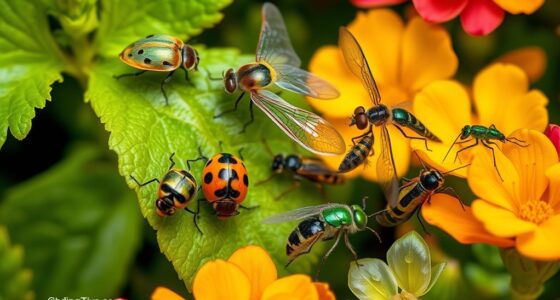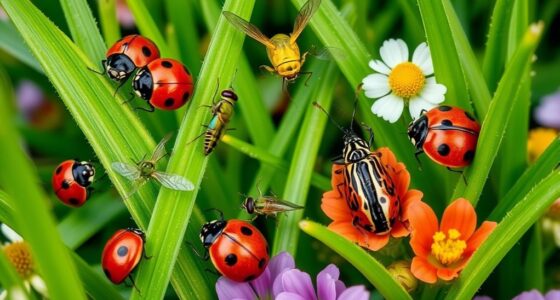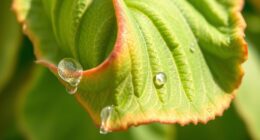Bats are natural nighttime predators that play a crucial role in controlling garden pests. They actively hunt insects like moths, beetles, flies, and mosquitoes, helping protect your plants and reduce the need for chemical pesticides. By creating a welcoming environment with bat houses, water sources, and minimal lighting, you can attract these beneficial creatures. If you’re curious about how to encourage bats and maximize their pest control talents, there’s more to discover.
Key Takeaways
- Bats actively hunt insects like moths, beetles, and flies during their nocturnal activity, reducing pest populations in gardens.
- They consume large quantities of pests each night, providing natural and effective pest control.
- Installing bat houses and reducing nighttime lighting attract bats to garden areas.
- Bats help decrease reliance on chemical pesticides, promoting healthier garden ecosystems.
- They contribute to sustainable pest management by naturally controlling pests without harming beneficial insects.
How Bats Help Keep Your Garden Pest-Free

Bats play a crucial role in keeping your garden free of pests by actively hunting insects at night. Their nocturnal behavior means they’re awake and alert when pests are most active, making them natural pest controllers. During bat migration, they travel great distances to find suitable roosting sites and abundant food sources, which helps maintain healthy ecosystems. As they forage, bats consume大量 insects, including many garden pests like moths and beetles. This natural pest control reduces your reliance on chemical pesticides, promoting a healthier environment. Their nighttime activity also means they’re less likely to disturb your daytime activities while effectively reducing pest populations. By understanding their nocturnal habits and migration patterns, you can appreciate how essential bats are for maintaining pest-free gardens naturally. Supporting their role in ecosystem balance further highlights the importance of protecting these beneficial creatures.
The Types of Pests Bats Target at Night
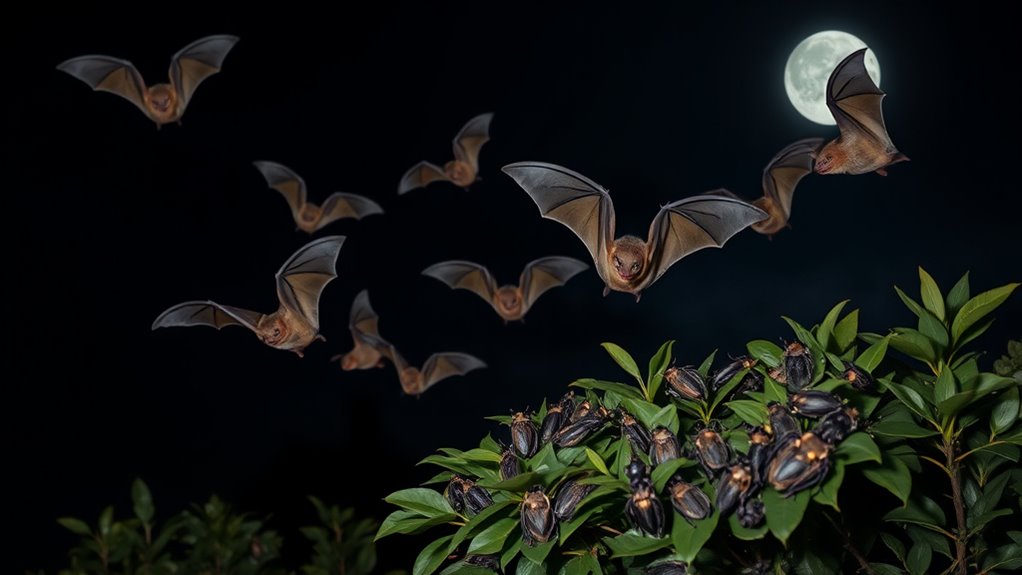
At night, bats focus their efforts on hunting specific pests that can damage your garden and disrupt the balance of your ecosystem. Their nocturnal hunting targets a range of insects, thanks to their incredible ability to detect insect diversity. These pests often include:
- Moths, which can ruin your plants with their larvae
- Beetles that feed on leaves and roots
- Flies that spread disease to your crops
- Mosquitoes that bother you during evening hours
- Crop pests like certain caterpillars
Additionally, understanding the emergency preparedness essentials can help you protect your garden and community from pest outbreaks and other unforeseen challenges.
Creating a Bat-Friendly Environment in Your Garden
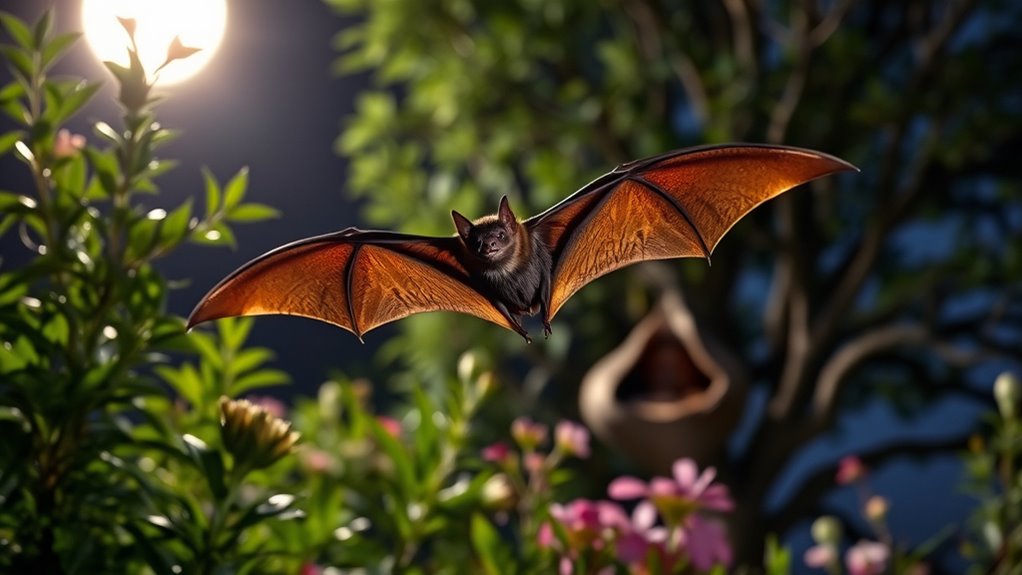
Creating a bat-friendly environment in your garden can considerably boost natural pest control. To do this, you should provide a suitable bat habitat, such as installing bat houses or leaving some natural roosting spots like old trees or brush piles. Minimize bright outdoor lighting, which deters bats, and reduce pesticide use to protect their food sources and support bat conservation efforts. Keep water sources nearby, like ponds or birdbaths, to encourage bats to stay in your garden. Creating these conditions not only benefits the local bat population but also helps maintain a balanced ecosystem by naturally controlling pests. By making your garden inviting to bats, you support both bat conservation and your garden’s health. Additionally, understanding the importance of color accuracy and habitat needs can help you create a more welcoming environment for these beneficial creatures.
The Benefits of Natural Pest Control With Bats
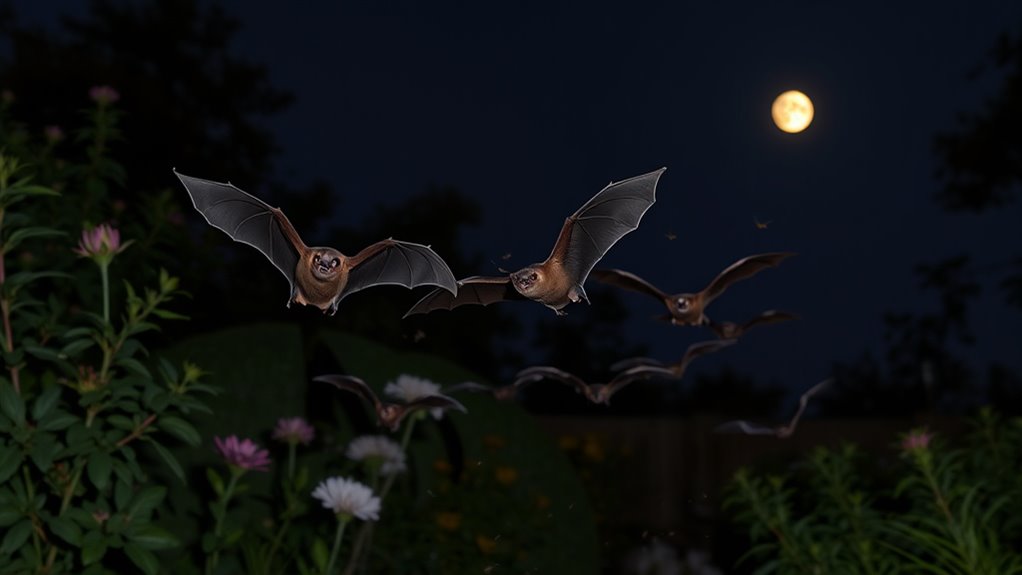
Using bats for pest control is highly effective, as they can consume thousands of insects each night. This natural method reduces your reliance on chemical pesticides, making your garden safer for people and wildlife. Plus, it’s an eco-friendly solution that benefits the environment while keeping pests in check.
Pest Reduction Effectiveness
Bats are highly effective natural predators when it comes to controlling garden pests, providing a sustainable alternative to chemical pesticides. Their nightly foraging can considerably reduce populations of moths, beetles, and other crop-damaging insects. By encouraging bat activity through bat-friendly habitats, you support bat migration and bolster bat conservation efforts. This natural pest control is not only eco-friendly but also cost-effective over time. Regularly observing bat activity can give you insight into the health of your garden ecosystem.
Eco-Friendly Pest Management
Because they naturally hunt insects each night, bats offer an eco-friendly way to manage garden pests without relying on chemical pesticides. Their nocturnal behavior means they hunt when pests are most active, reducing the need for harmful chemicals that can harm beneficial insects and the environment. Supporting bat conservation helps maintain healthy, balanced ecosystems, as bats control pest populations naturally. Using bat houses or creating a suitable habitat encourages their presence in your garden. This natural pest control method is safe, sustainable, and effective, minimizing chemical runoff and preserving pollinators. Promoting bat-friendly environments can increase their presence and effectiveness in pest management. By embracing the benefits of natural pest management with bats, you protect biodiversity while keeping your garden healthy and pest-free. It’s a simple, environmentally friendly approach that benefits everyone.
Common Myths and Facts About Garden Bats

Many misconceptions surround garden bats, leading some gardeners to fear or dismiss their benefits. A common bat myth is that bats are dangerous or aggressive, but bat facts show they are shy and rarely bother humans. Bats help control pests naturally, yet some think they spread disease or damage fruit. In reality, they rarely carry harmful illnesses to people, and their presence benefits your garden.
Bats are not blind; they use echolocation to hunt.
They do not intentionally target humans.
Bats do not cause structural damage.
They prefer insects over fruit or crops.
Their guano is a natural fertilizer.
Understanding bat behavior helps you appreciate their role as beneficial nocturnal predators in your garden ecosystem.
Tips for Attracting Bats to Your Outdoor Space
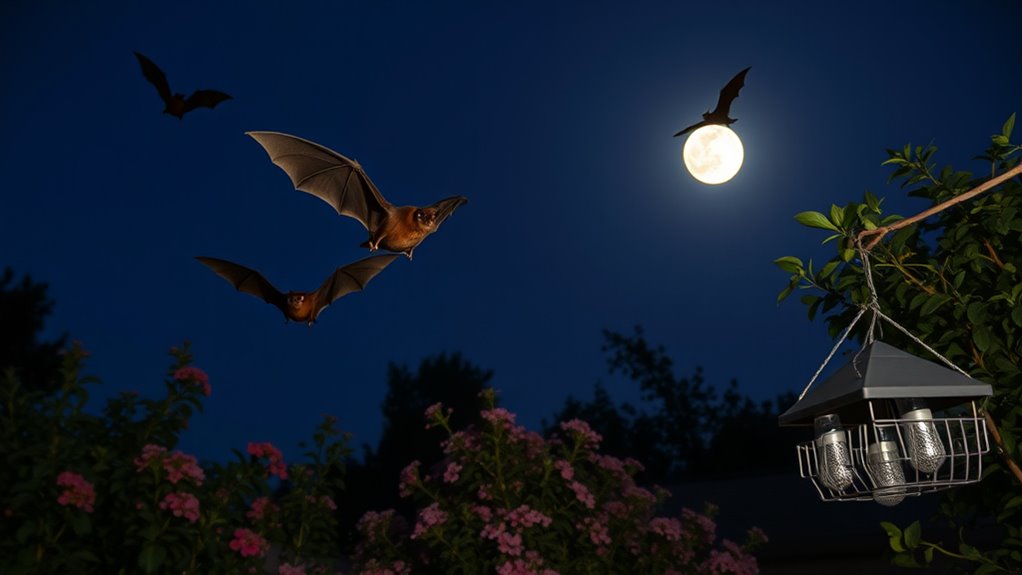
Creating inviting habitats is essential for attracting bats to your outdoor space. To support bat conservation, provide roosting sites like bat houses or leave dead trees and logs. Minimize bright outdoor lighting, which can deter bats. Plant native trees and shrubs to offer shelter and insect food sources. Ensuring access to water, such as ponds or birdbaths, also encourages bats to visit. Use the table below to identify key habitat features and their benefits:
| Habitat Feature | Benefit |
|---|---|
| Bat houses | Safe roosting sites |
| Native plants | Food and shelter |
| Water sources | Drinking and foraging opportunities |
| Reduced lighting | Less disturbance for bat activity |
A suitable environment can also influence the breed’s charm and make your outdoor space more inviting for these beneficial nocturnal predators.
Frequently Asked Questions
How Do Bats Locate Pests in a Large Garden Area?
You might wonder how bats find pests over a large garden. They use echolocation techniques, emitting high-frequency sounds that bounce off objects and insects. By interpreting these echoes, they locate prey even in vast areas. During foraging flight patterns, bats adjust their movements, flying in loops or zigzags to cover more ground efficiently. This sophisticated hunting behavior helps them pinpoint pests across your garden effectively.
Are There Specific Bat Species More Effective at Pest Control?
Certain bat species are more effective at pest control because of their size, diet, and foraging habits. You’ll find that species like the little brown bat and big brown bat excel at pest control efficiency due to their high insect consumption and adaptable foraging strategies. By encouraging these species in your garden, you maximize pest suppression, making them natural allies for your pest management efforts.
Can Bats Harm Beneficial Insects in My Garden?
You might wonder if bats harm beneficial insects in your garden. Insect predation varies based on bat diet diversity, but generally, bats prefer pest insects like moths and mosquitoes over beneficial ones. While some harmless insects may occasionally be caught, bats mainly target pests, helping you control garden pests naturally. By supporting a diverse bat population, you promote a balanced ecosystem that minimizes harm to beneficial insects.
What Is the Best Time of Year to Attract Bats for Pest Control?
You should aim to attract bats during their active seasons, typically in late spring through summer, aligning with their breeding cycles. This period supports their seasonal migration and guarantees they’re present when pest populations increase. By providing suitable roosts and water sources during these months, you encourage bats to stay, helping you naturally control pests while benefiting from their seasonal behavior and breeding habits.
How Do Weather Conditions Affect Bat Activity and Pest Control Efficiency?
Weather conditions directly influence bat activity and pest control efficiency. Warm, calm nights encourage more bat migration and feeding, making pest control more effective. Conversely, heavy rain, strong winds, or low temperatures reduce their activity. By checking weather forecasting, you can predict when bats will be most active, optimizing pest control efforts. Understanding these patterns helps you support bats’ natural pest control roles, especially during peak activity times.
Conclusion
By welcoming bats into your garden, you invite a gentle guardian that patiently watches over your plants. Their nightly patrols quietly nurture a thriving, balanced ecosystem, reducing the need for harsh chemicals. Embrace these humble allies, and you’ll discover a peaceful harmony blooming in your outdoor space. Let their silent presence remind you of nature’s quiet wonders, fostering a garden that’s both vibrant and beautifully cared for—an enduring gift from these nocturnal protectors.


